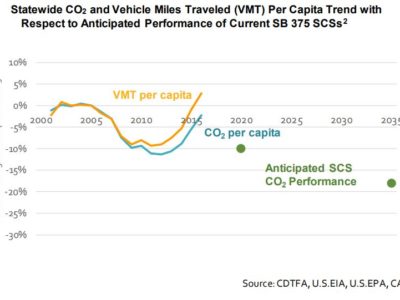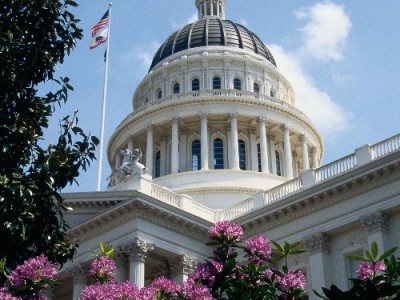On magical, mythical, market unicorn fairies
Or how we can get effective climate policy without government intervention
I don’t usually respond to op-ed columns, but the column by Bret Stephens in the New York Times on climate policy yesterday is so …. foolish that I think it needs a response. And more to the point, the foolishness in the column can help illuminate some of the major problems that have developed as we think about policies responses to our climate crisis. To recap, Stephens laments the recent protests in France over an increased gas tax enacted as a climate policy ...
CONTINUE READINGAssessing Los Angeles’ Steps Toward Transit-Oriented Communities
TOC A Year Later: Is It Working?
As my Legal Planet colleagues Meredith Hankins and Ethan Elkind have written, decreasing VMT by changing the way we think about urban development is a high priority, especially here in California. Amid last year’s slew of housing-related initiatives, Los Angeles took its own stab at a two-birds-one-stone approach to sustainable, affordable residential development, adopting the Transit-Oriented Communities (TOC) Program Guidelines, which went into effect in September ...
CONTINUE READINGTwo Years & Counting: A Historical Perspective
How does Trump compare with Bush, the last GOP President?
This is the second of three posts assessing the first two years of the Trump Administration. We all seem to be subscribed to the “All Trump News, All the Time” newsfeed. It may be helpful to step back a bit and compare Trump with his last Republican predecessor, George W. Bush. How do the two stack up? Bush and Trump were very different in character and style, but their regulatory aims were similar. Bush and Trump were both trying to steer the country in the sam...
CONTINUE READINGAuctioning the Upzone: A New Strategy for Inducing Local-Government Compliance with State Housing Policies
New White Paper by U.C. Davis Law Professors Recommends Market-Based Tool to Incentivize Intensified Urban Development in California and Beyond
(Note: the following post was co-authored by U.C. Davis School of Law Professors Chris Elmendorf and Darien Shanske; the white paper discussed in the post is their work product.) California's housing policies--a topic that for years received precious little attention from state officials--has suddenly become the Golden State's hottest political and policy issue. The California Legislature passed no fewer than 15 new housing bills in 2017, and then doubled down o...
CONTINUE READINGClimate Negotiations Start in Poland: Setting the Stage
Much at Stake in COP-24, Including Negotiation of Paris Rulebook to Implement 2015 Commitments
This week and next, negotiators are meeting in Poland for the big annual international climate-change meeting. This meeting, formally, is the 24th Conference of the Parties to the UN Framework Convention on Climate Change, the 1992 treaty that provides the foundation for all official international action on climate change, and informally is called "COP-24." It is now three years since the 2015 Paris meeting, which adopted a set of agreements defining a new framework f...
CONTINUE READINGWe’re Never Going to Meet Our GHG Transportation Goals Unless We Radically Rethink Our Cities
Introducing an ongoing series focused on reducing vehicle miles traveled as a crucial climate mitigation strategy
I’ve been thinking a lot lately about vehicle miles traveled, or VMT. Specifically, why is it so hard to get people to think seriously about reducing VMT as a climate mitigation strategy? Building on my earlier ode to electric scooters, this post begins a semi-regular series on different aspects of VMT reduction strategies, beginning with an introduction today to VMT and its relationship to climate change goals. We know that the transportation sector is now the bigg...
CONTINUE READINGRecommendations For Governor-Elect Newsom To Address Wildfire, Water, & Climate and Transportation Threats
New CLEE and Resources Legacy Fund report based on three expert convenings
Climate change exacerbates the droughts, floods, and wildfires that Californians now regularly experience, making them even more extreme and unpredictable. Gavin Newsom, California’s next governor, faces the urgent challenge of simultaneously preparing for inevitable disaster, improving the quality of life for residents, and minimizing the greenhouse gas emissions of a society of nearly 40 million people. In that spirit, UC Berkeley School of Law’s Center for Law,...
CONTINUE READINGMajor Legislation Reintroduced To Limit Local Restrictions On Housing Near Transit
State Sen. Scott Wiener takes another stab at solving California's severe housing shortage
Last year, State Senator Scott Wiener (D-San Francisco) went right to the heart of California's massive housing shortage in its job-rich centers with SB 827, which would have limited local restrictions on housing near transit. The bill went down in committee, a victim of election year politics and diverse opposition from wealthy homeowners, tenants rights advocates, and even a few misguided environmental organizations. Now Senator Wiener is back at it with Senate Bill...
CONTINUE READINGTwo Years and Counting: Trump at Mid-Term
Trump has been in office for nearly two years. Where do things stand?
In September 2017 – that seems so long ago! -- Eric Biber and I released a report assessing the state of play in environmental issues 200 days into the Trump Administration, based on an earlier series of blog posts. As we end Trump’s second year, it’s time to bring that assessment up to date. This is the first of three posts examining what Trump has done (and hasn’t done) in terms of environment and energy. For this first post, I’ll follow the same outline...
CONTINUE READINGGood News From India
While we’ve been obsessing about Trump, India has made great strides in renewable energy.
We get so focused on the problems in our own country that it’s easy to lose track of what’s happening globally. It turns out that while we’ve been mired in our own travails, India has been making remarkableprogress on renewable energy. What happens in India has tremendous significance. It is now the most populous country in the world, with 1.3 billion people – three times the population of the U.S. It’s a poor country, with per capital income of about $2000,...
CONTINUE READING







